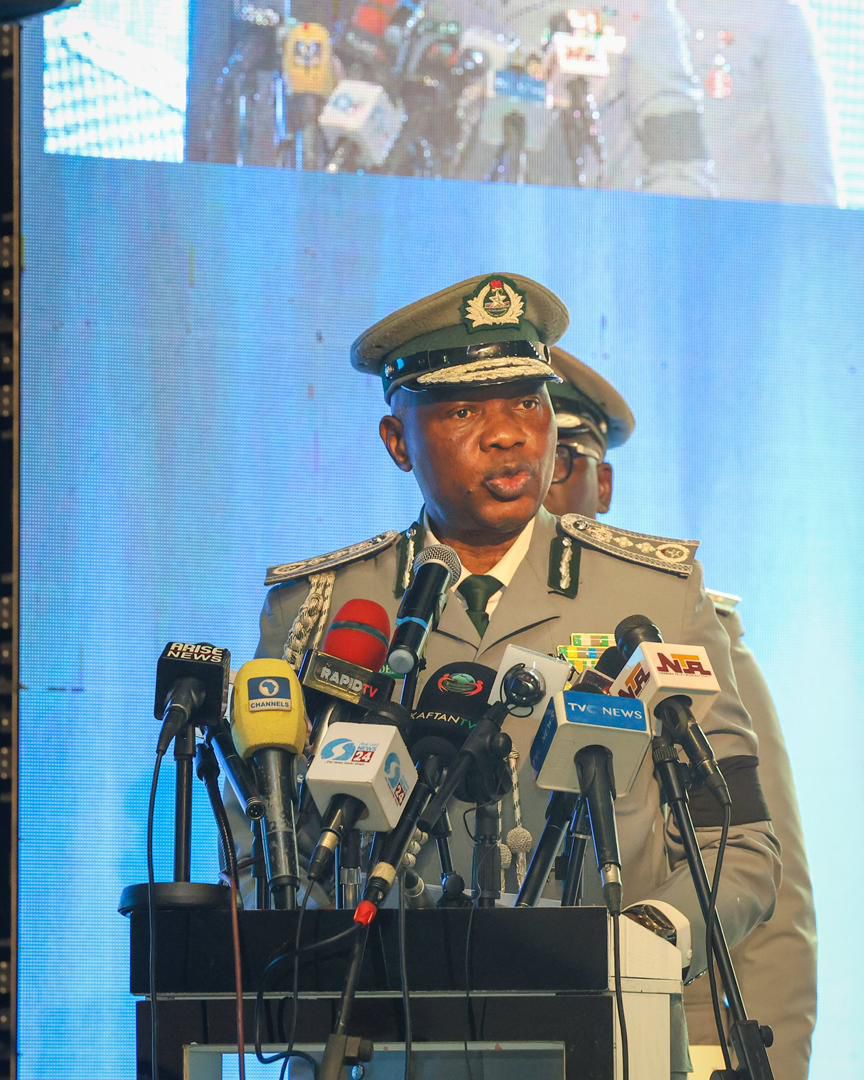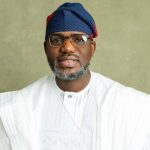...To get all news updates, Join our WhatsApp Group (Click Here)
Also Join our WhatsApp Channel (Click Here)
By Oladapo Sofowora
Whether admired or criticized, Comptroller General of Customs, Bashir Adewale Adeniyi MFR, is unwavering in his mission to transform the Nigeria Customs Service. His primary focus is to safeguard the nation’s borders against economic sabotage while boosting revenue and facilitating seamless trade relations between importers and exporters, ultimately fostering economic growth and stability for Nigeria.
Since his appointment by President Bola Ahmed Tinubu’s administration last year, Bashir has utilized his exceptional acumen and strategic insight to elevate this crucial law enforcement agency. Many initially doubted his ability to succeed, but he is decisively silencing his critics with impressive outcomes that have solidified the customs agency as one of the largest revenue-generating bodies in the country, channelling trillions of Naira into government coffers annually and enhancing trade facilitation.
Adeniyi, often dubbed the “new sheriff in town,” is unyielding in his approach, having made it clear to those who previously exploited systemic weaknesses that their days of advantage are numbered. A natural team player, he leads not from behind a desk but from the forefront, diligently ensuring that every loophole is sealed. Those who have profited at the country’s expense feel the consequences, as Adeniyi pursues them relentlessly.
He believes that for the customs service to function optimally, it must not only focus on revenue generation but also strive to portray Nigeria positively on the global stage. To that end, he has streamlined the cargo release and evaluation processes through cutting-edge technology, significantly reducing the bureaucratic red tape that plagued the service. While his reforms have drawn ire from some quarters, he remains undeterred. Adeniyi has equipped all commands and zones, preparing them to combat both internal and external corruption. Smugglers, in particular, now view him as a formidable obstacle.
In a resolute effort to protect Nigeria’s agricultural sector, Adeniyi has strategically assigned capable personnel to the nation’s borders, issuing a stringent directive that anyone attempting to undermine the Nigerian economy is seen as an enemy and will face no leniency. This has resulted in tighter border security and has enabled local producers to flourish, attracting increased investment in vital sectors, especially agriculture. Internally, CGC Adewale is effecting a groundbreaking reform of the customs workforce by emphasizing professionalism and ethical standards. He has initiated extensive training programs focused on customs law, risk assessment, and technology, aiming to cultivate a skilled workforce equipped to tackle contemporary customs challenges.
His unwavering stance against corruption, coupled with a strong emphasis on accountability, seeks to restore public confidence in the Nigeria Customs Service. By fostering a culture steeped in ethics, CGC Adewale aspires to elevate the agency into one that commands respect for its integrity and fairness. Adeniyi also recognizes the significance of collaboration; thus, he actively partners with other agencies to forge a synergistic relationship, sharing intelligence that effectively combats smuggling and enhances the interception of illegal goods. The agency has recently reported seizures worth billions while intercepting arms and ammunition, marking a significant turn in fortunes as he strives to solidify the Customs’ reputation as a reputable agency, reversing the negative narrative that has long surrounded it.
Under his stewardship, he has prioritized the welfare of staff, the development of women, and the motivation of officers, fostering a dedicated workforce eager to protect the nation from economic sabotage. Significant seizures from petroleum products to endangered species parts, such as pangolin scales, donkey skins, and elephant tusks, alongside smuggled vehicles, have underscored Adeniyi’s commitment to elevating the agency above others. The digitalization of key customs processes has made trade more efficient, decreasing unnecessary human interaction to minimize corruption.
Despite the considerable challenges faced, during Adeniyi’s tenure, Customs has remarkably generated an impressive N5,079,455,088,194.38, exceeding the 2024 target of N5 trillion. As part of ongoing reform measures, six beneficiaries of the Authorized Economic Operators (AEO) program have been selected, with an additional 21 requests processed under an advance ruling initiative designed to expedite customs decision-making on import and export cargoes before they arrive at the ports. Adeniyi’s significant strides, alongside streamlined cargo alerts, have begun to reshuffle the customs landscape in Nigeria, introducing hope and renewed purpose to this vital service.
Beyond the realm of security, the collaborative efforts extend into vital economic initiatives such as the African Continental Free Trade Area (AfCFTA). This ambitious project aims to create a cohesive market across the continent, fostering seamless trade among African nations. Adewale’s significant involvement in the development of AfCFTA-related policies highlights his unwavering commitment to transforming the Nigeria Customs Service (NCS) into an agency that not only facilitates economic integration but also harmonizes customs standards across Africa.
This harmonization is crucial for streamlining trade flows and unlocking a plethora of economic opportunities. Despite facing fierce opposition and deliberate campaigns aimed at undermining his reputation, Adeniyi has remained resolute, undeterred by the negative tactics employed by his detractors. He continues to focus on his responsibilities with diligence and integrity. While some have resorted to disparagement, Adeniyi has made sizable advancements toward realizing his ambitious vision of elevating the customs service to an esteemed position on a global scale.
This commitment to progress is exemplified through the ongoing Comptroller of Customs conference, aptly themed “Nigeria Customs Service: Engaging Traditional and New Partners with Purpose.” This conference, which had been previously halted for several years, has been revived since Adeniyi took the helm, offering the NCS a platform to engage in meaningful discussions. It serves as an opportunity to reassess strategies, ensuring the agency remains afloat and true to its potential in enhancing trade facilitation while also safeguarding our local economy.
True to the adage that the reward for a job well done is more work, Adeniyi is prepared to meet the challenges head-on, ready to deliver exceptional results regardless of the circumstances. The Nigeria Customs Service has never experienced such a level of organization and efficiency since its inception, earning it recognition as one of the most structured agencies in Nigeria today. This achievement is a testament to Adeniyi’s dedication and commitment to promoting excellence and prosperity within the service.
You can get every of our news as soon as they drop on WhatsApp ...To get all news updates, Join our WhatsApp Group (Click Here)
Also Join our WhatsApp Channel (Click Here)

















